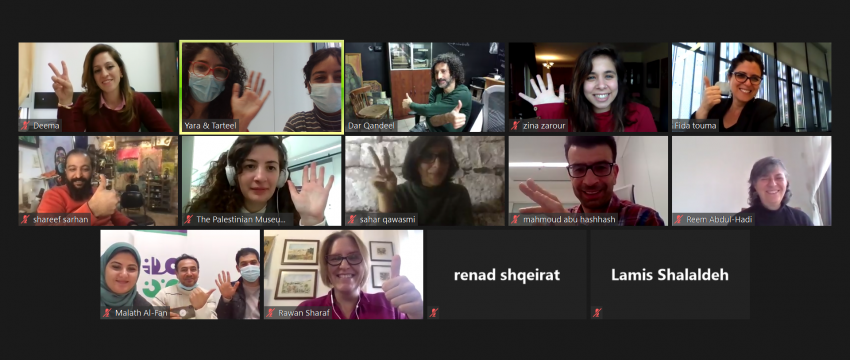
The A.M. Qattan Foundation, within the context of the “Visual Arts: A Flourishing Field” (VAFF) project, recently held a Zoom meeting bringing together the project partners from art collectives and institutions working in the field of visual arts. The meeting was attended by 36 participants from Shababeek for Contemporary Art; the art department of the General Union of Cultural Centres in Gaza; the Contemporary Art, Music and Design Department at Birzeit University; the Palestinian Art Court – al Hoash; Dar al-Kalima University College of Arts and Culture; Dar Qandeel for Arts and Culture; Sakiya – Art | Science | Agriculture; the Palestinian Museum; the Khalil Sakakini Cultural Centre (KSCC); Eltiqa Group; Gaza Association for Culture and Arts; and the Visual Arts Forum (VAF).
At the beginning of the meeting, the participants introduced their programmes and preoccupations, sharing their work experiences in the past year and ways of adapting programmes to fit the challenges imposed by the COVID-19 pandemic. They shared inspiring and alternative work methods and presented programmes developed during the pandemic, such as the “Khalina Nshuf” (Let’s See) initiative launched collaboratively by Dar Qandeel and VAF and the “Wasla Grant Programme” launched by Shababeek. Other projects that reformulated their ways of exhibiting and participating include the “Your Home Is a Shelter” project by Eltiqa Group and the “Artist at Work” exhibition by KSCC. Birzeit University focussed on its online artist talks programme, which has hosted tens of local and international artists, and Dar al-Kalima University College finished teaching online the first course of its artwork restoration and renovation academic track. Other initiatives focussed on continuing their connections with the audience through utilising technology and online platforms, as in the online educational programme organised by the Palestinian Museum for its exhibition “Printed in Jerusalem.” Other programmes were able to solve workspace issues by dividing workers onto different shifts to ensure their safety following safety procedures and demonstrating high flexibility. The Palestinian Art Court continued their work on archives and Sakiya completed work on developing its site infrastructure.
Additionally, this meeting provided an opportunity for a discussion on present challenges facing art institutions and collectives in the visual arts field. COVID-19 has exacerbated these challenges due to the nature of institutional work and their audience.
“It was very inspiring to learn about the partners, their diverse projects and ways of coping with current challenges and future plans,” Sahar Qawasmi, general director of Sakiya, commented.
The discussion also tackled facing future challenges, emerging needs and new ways of developing collaborations between art institutions to enrich the cultural scene and enhance the sustainability and the quality of programmes.
Among the challenges was the difficulty of attracting audiences to attend online programmes, obscured by the vast number of activities offered online. This foreshadows the threat of audiences losing interest in participating if online programming continues to be the only option for the arts field. Furthermore, the economic and political context burdening and marginalising cultural work cannot be overlooked.
The participants discussed the importance of understanding the interests of younger generations. Their diversity of interests and approaches, and their willingness to question institutional performances and programmes will be beneficial to reconnect institutions with the community and to build new relationships that may resituate each in a way that serves their common issues.
The participants also highlighted the necessity of working together, developing new methods of participatory and collaborative work amongst each other to benefit the field with the existing skills, tools and resources available, and adopting a strategy for an effective partnership that preserves and builds on the existing social capital.
Additionally, the participants recommended establishing lines of communication to discuss complementary roles between institutions working on intersecting or common themes, such as visual arts education institutions. They also agreed on holding further conversations to develop the approaches and directions of partner programmes that require an exchange of expertise and experiences.
“Thank you for this wonderful opportunity to meet and discuss the cultural scene together. I believe that this meeting should be part of the planning of all institutions working in culture—to think and discuss expertise and developing partnerships together—in order to create a new mode of managing culture in Palestine,” Mohammed Hawajri, artist and member of the Eltiqa, commented.
The VAFF project launched its second round in 2019. It aims to support organisations working in the visual arts field to enhance their capacities and sustainability and to develop their visual arts education and research programmes, available to art students, artists and professionals. VAFF also aims to enable art institutions to support artists and art professionals and to build a wider audience base for the visual arts in Palestine.
The project is funded by:

